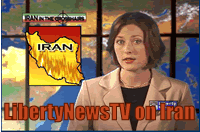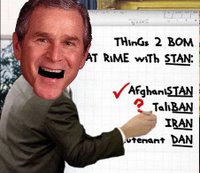Fool Me Twice
By Joseph Cirincione
I used to think that the Bush administration wasn’t seriously considering a military strike on Iran, because it would only accelerate Iran’s nuclear program. But what we're seeing and hearing on Iran today seems awfully familiar. That may be because some U.S. officials have already decided they want to hit Iran hard.
Does this story line sound familiar? The vice president of the United States gives a major speech focused on the threat from an oil-rich nation in the Middle East. The U.S. secretary of state tells congress that the same nation is our most serious global challenge. The secretary of defense calls that nation the leading supporter of global terrorism. The president blames it for attacks on U.S. troops. The intelligence agencies say the nuclear threat from this nation is 10 years away, but the director of intelligence paints a more ominous picture. A new U.S. national security strategy trumpets preemptive attacks and highlights the country as a major threat. And neoconservatives beat the war drums, as the cable media banner their stories with words like “countdown” and “showdown.”
The nation making headlines today, of course, is Iran, not Iraq. But the parallels are striking. Three years after senior administration officials systematically misled the nation into a disastrous war, they could well be trying to do it again.
Nothing is clear, yet. For months, I have told interviewers that no senior political or military official was seriously considering a military attack on Iran. In the last few weeks, I have changed my view. In part, this shift was triggered by colleagues with close ties to the Pentagon and the executive branch who have convinced me that some senior officials have already made up their minds: They want to hit Iran.
I argued with my friends. I pointed out that a military strike would be disastrous for the United States. It would rally the Iranian public around an otherwise unpopular regime, inflame anti-American anger around the Muslim world, and jeopardize the already fragile U.S. position in Iraq. And it would accelerate, not delay, the Iranian nuclear program. Hard-liners in Tehran would be proven right in their claim that the only thing that can deter the United States is a nuclear bomb. Iranian leaders could respond with a crash nuclear program that could produce a bomb in a few years.
My friends reminded me that I had said the same about Iraq—that I was the last remaining person in Washington who believed President George W. Bush when he said that he was committed to a diplomatic solution. But this time, it is the administration’s own statements that have convinced me. What I previously dismissed as posturing, I now believe may be a coordinated campaign to prepare for a military strike on Iran.
The unfolding administration strategy appears to be an effort to repeat its successful campaign for the Iraq war. It is now trying to link Iran to the 9/11 attacks by repeatedly claiming that Iran is the main state sponsor of terrorism in the world (though this suggestion is highly questionable). It is also attempting to make the threat urgent by arguing that Iran might soon pass a “point of no return” if it can perfect the technology of enriching uranium, even though many other nations have gone far beyond Iran’s capabilities and stopped their programs short of weapons. And, of course, it is now publicly linking Iran to the Iraqi insurgency and the improvised explosive devices used to kill and maim U.S. troops in Iraq, though Joint Chiefs Chairman Gen. Peter Pace admitted there is no evidence to support this claim.
If diplomacy fails, the administration might be able to convince leading Democrats to back a resolution for the use of force against Iran. Many Democrats have been trying to burnish a hawkish image and place themselves to the right of the president on this issue. They may find themselves trapped by their own rhetoric, particularly those with presidential ambitions.
The factual debate during the next six months will revolve around the threat assessment. How close is Iran to developing the ability to enrich uranium for fuel or bombs? Is there a secret weapons program? Are there secret underground facilities? What would it mean if small-scale enrichment experiments succeed?
Fortunately, we know more about Iran’s nuclear program now than we ever knew about Iraq’s (or, for that matter, those of India, Israel, and Pakistan). International Atomic Energy Agency (IAEA) inspectors have been in Iran for more than 3 years investigating all claims of weapons-related work. The United States has satellite reconnaissance, covert programs, and Iranian dissidents providing further information. The key now is to get all this information on the table for an open debate.
The administration should now declassify the information it used to estimate how long it will be until Iran has the capability to make a bomb. The Washington Post reported last August that this national intelligence estimate says Iran is a decade away. We need to see the basis for this judgment and all, if any, dissenting opinions. The congressional intelligence committees should be conducting their own reviews of the assessments, including open hearings with independent experts and IAEA officials. Influential groups, such as the Council on Foreign Relations, should conduct their own sessions and studies.
An accurate and fully understood assessment of the status and potential of Iran’s nuclear program is the essential basis for any policy. We cannot let the political or ideological agenda of a small group determine a national security decision that could create havoc in a critical area of the globe. Not again.
Joseph Cirincione is director for non-proliferation at the Carnegie Endowment for International Peace.
Source: foreignpolicy.com
I used to think that the Bush administration wasn’t seriously considering a military strike on Iran, because it would only accelerate Iran’s nuclear program. But what we're seeing and hearing on Iran today seems awfully familiar. That may be because some U.S. officials have already decided they want to hit Iran hard.
Does this story line sound familiar? The vice president of the United States gives a major speech focused on the threat from an oil-rich nation in the Middle East. The U.S. secretary of state tells congress that the same nation is our most serious global challenge. The secretary of defense calls that nation the leading supporter of global terrorism. The president blames it for attacks on U.S. troops. The intelligence agencies say the nuclear threat from this nation is 10 years away, but the director of intelligence paints a more ominous picture. A new U.S. national security strategy trumpets preemptive attacks and highlights the country as a major threat. And neoconservatives beat the war drums, as the cable media banner their stories with words like “countdown” and “showdown.”
The nation making headlines today, of course, is Iran, not Iraq. But the parallels are striking. Three years after senior administration officials systematically misled the nation into a disastrous war, they could well be trying to do it again.
Nothing is clear, yet. For months, I have told interviewers that no senior political or military official was seriously considering a military attack on Iran. In the last few weeks, I have changed my view. In part, this shift was triggered by colleagues with close ties to the Pentagon and the executive branch who have convinced me that some senior officials have already made up their minds: They want to hit Iran.
I argued with my friends. I pointed out that a military strike would be disastrous for the United States. It would rally the Iranian public around an otherwise unpopular regime, inflame anti-American anger around the Muslim world, and jeopardize the already fragile U.S. position in Iraq. And it would accelerate, not delay, the Iranian nuclear program. Hard-liners in Tehran would be proven right in their claim that the only thing that can deter the United States is a nuclear bomb. Iranian leaders could respond with a crash nuclear program that could produce a bomb in a few years.
My friends reminded me that I had said the same about Iraq—that I was the last remaining person in Washington who believed President George W. Bush when he said that he was committed to a diplomatic solution. But this time, it is the administration’s own statements that have convinced me. What I previously dismissed as posturing, I now believe may be a coordinated campaign to prepare for a military strike on Iran.
The unfolding administration strategy appears to be an effort to repeat its successful campaign for the Iraq war. It is now trying to link Iran to the 9/11 attacks by repeatedly claiming that Iran is the main state sponsor of terrorism in the world (though this suggestion is highly questionable). It is also attempting to make the threat urgent by arguing that Iran might soon pass a “point of no return” if it can perfect the technology of enriching uranium, even though many other nations have gone far beyond Iran’s capabilities and stopped their programs short of weapons. And, of course, it is now publicly linking Iran to the Iraqi insurgency and the improvised explosive devices used to kill and maim U.S. troops in Iraq, though Joint Chiefs Chairman Gen. Peter Pace admitted there is no evidence to support this claim.
If diplomacy fails, the administration might be able to convince leading Democrats to back a resolution for the use of force against Iran. Many Democrats have been trying to burnish a hawkish image and place themselves to the right of the president on this issue. They may find themselves trapped by their own rhetoric, particularly those with presidential ambitions.
The factual debate during the next six months will revolve around the threat assessment. How close is Iran to developing the ability to enrich uranium for fuel or bombs? Is there a secret weapons program? Are there secret underground facilities? What would it mean if small-scale enrichment experiments succeed?
Fortunately, we know more about Iran’s nuclear program now than we ever knew about Iraq’s (or, for that matter, those of India, Israel, and Pakistan). International Atomic Energy Agency (IAEA) inspectors have been in Iran for more than 3 years investigating all claims of weapons-related work. The United States has satellite reconnaissance, covert programs, and Iranian dissidents providing further information. The key now is to get all this information on the table for an open debate.
The administration should now declassify the information it used to estimate how long it will be until Iran has the capability to make a bomb. The Washington Post reported last August that this national intelligence estimate says Iran is a decade away. We need to see the basis for this judgment and all, if any, dissenting opinions. The congressional intelligence committees should be conducting their own reviews of the assessments, including open hearings with independent experts and IAEA officials. Influential groups, such as the Council on Foreign Relations, should conduct their own sessions and studies.
An accurate and fully understood assessment of the status and potential of Iran’s nuclear program is the essential basis for any policy. We cannot let the political or ideological agenda of a small group determine a national security decision that could create havoc in a critical area of the globe. Not again.
Joseph Cirincione is director for non-proliferation at the Carnegie Endowment for International Peace.
Source: foreignpolicy.com
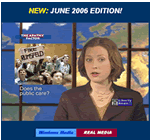 Liberty News-Report on Impeachment
Liberty News-Report on Impeachment
 Pink- Dear Mr. President
Pink- Dear Mr. President
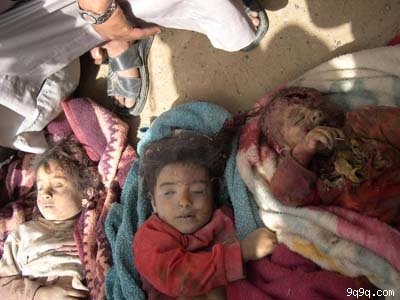 A few of the Iraqi "insurgents" the US Marines murdered
A few of the Iraqi "insurgents" the US Marines murdered
 Lies and the Lying Liars
Lies and the Lying Liars

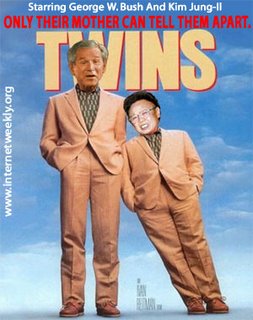 Dancing all night with military dictators
Dancing all night with military dictators
 You are a Donkey, Mr. Danger!
You are a Donkey, Mr. Danger!
 'President' Al Gore
'President' Al Gore
 Ahmadinejad's Letter To Bush
Ahmadinejad's Letter To Bush
